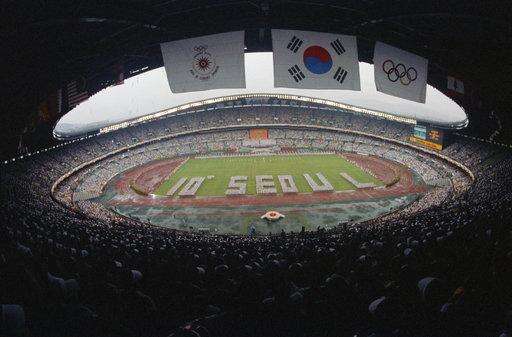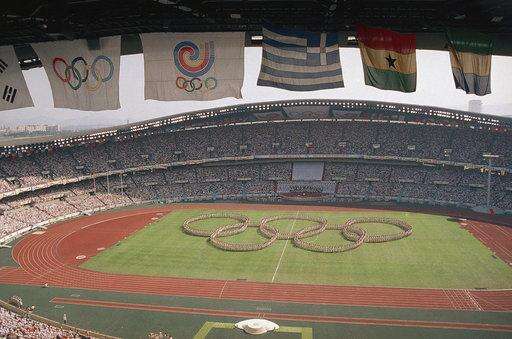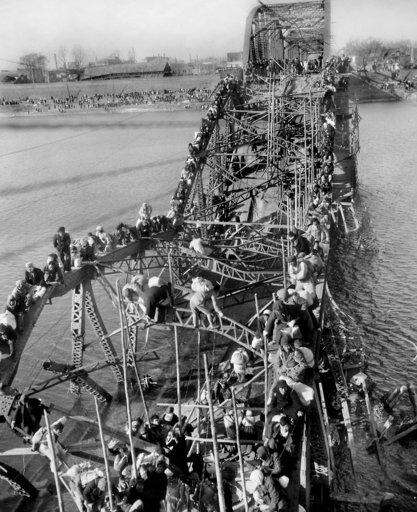FILE - In this Feb. 10, 2006 file photo, Korea flag-bearers Bora Lee and Jong-In Lee, carrying a unification flag, lead their teams into the stadium during the 2006 Winter Olympics opening ceremony in Turin, Italy. The two Koreas continued their joint march tradition at the Turin Winter Olympics. Sports ties between the rival Koreas often mirror their rocky political ties. (AP Photo/Amy Sancetta, File)
The Associated Press
SEOUL, South Korea (AP) - Sports ties between North and South Korea often mirror their rocky political ties.
A low point was when North Korean medalists ignored South Korean rivals who tried to shake their hands at podiums ahead of the North's boycott of the 1988 Seoul Olympics.
During good times, and especially during the so-called Sunshine Era of the late '90s and 2000s, when the South tried to engage the North with huge aid shipments, the Koreas sent unified teams to international competitions and allowed their athletes to parade together at Olympic ceremonies.
With seven months until the Pyeongchang Olympics, South Korea's new President Moon Jae-in wants North Korea to attend the Winter Games as a way to encourage reconciliation on the divided Korean Peninsula. Success will depend largely on whether the Koreas can avoid the violence and animosity that has ruined sports cooperation throughout their history.
Some key moments in Korean sports:
__
1945: The Korean Peninsula is divided into a U.S.-backed South Korea and a Soviet- and Chinese-supported North Korea at the end of the World War II. The two Koreas fight a devastating war from 1950-53.
1986: Seoul, the South Korean capital, hosts the Asian Games. North Korea boycotts.
1988: Seoul hosts the Summer Olympics, and North Korea again boycotts. A year earlier, a South Korean passenger plane exploded, killing all 115 people aboard, and a captured North Korean agent told South Korean investigators that she bombed the jetliner at the order of North Korean leaders who wanted to disrupt the Seoul Games.
April 1991: The Koreas send their first-ever unified male and female teams to the world table tennis championships in Chiba, Japan. The women's team wins the championship by defeating the powerful Chinese.
June 1991: The Koreas send a youth soccer team to the FIFA championship in Portugal that reaches the quarterfinals.
2000: Athletes of the Koreas march together under a "unification flag" depicting their peninsula during the opening and closing ceremonies of the Sydney Olympics. It's the Koreas' first such parade since their 1945 division.
May-June 2002: South Korea co-hosts the World Cup with Japan and makes a storybook run to the semifinals. When the tournament is nearing its end, the navies of the two Koreas fight a naval skirmish that left six South Korean sailors dead near their disputed sea boundary. Many outside analysts viewed it not only as North Korean revenge over an earlier sea battle, but also as an effort to distract attention from the South's soccer success.
September-October 2002: North Korea attends the Asian Games in Busan, South Korea. The countries' athletes conduct a joint march at the opening and closing ceremonies. North Korea sends a cheering group of young women. Dubbed the "squad of beauties" in South Korean media, they often draw more attention than their athletes.
2003: North Korea participates in the University Games in Daegu, South Korea, and its athletes walk again with South Korean counterparts at the opening and closing ceremonies.
2004: Athletes of the two Koreas march jointly at the Athens Olympics.
2005: North Korea attends the 2005 Asian Athletics Championships in Incheon, South Korea. Included in the cheering squad was Ri Sol Ju, who is now the wife of North Korean leader Kim Jong Un.
2006: The two Koreas again march together at the Turin Winter Olympics.
2007: Athletes of the two Koreas march together at the Asian Winter Games in Changchun, China, but have not done so since.
2014: North Korea attends the Asian Games in Incheon, South Korea. At the close of the event, three top North Korean officials make a surprise visit and hold the first highest-level face-to-face talks with South Korea in five years.
April 2017: North Korea's women's ice hockey team comes to the South to participate in the group rounds of the world championships, while the South's national women's soccer team travels to the North for an Asian Cup qualifying match.
June 2017: North Korea's taekwondo demonstration team visits South Korea for its first performance in the rival country in 10 years.
In this Jan. 20, 2007 photo, athletes from North and South Korea wave during an opening ceremony for the Asian Winter Game in Changchun, China. Athletes of the two Koreas again conducted a joint march at the Asian Winter Games in Changchun, China. No such a joint march has occurred since then. Sports ties between the rival Koreas often mirror their rocky political ties. (Yonhap via AP)
The Associated Press
FILE - In this Aug. 31, 2005 file photo, North and South Korean athletes mingle as they march together during the opening ceremony of the 16th Asian Athletics Championships 2005 in Incheon, South Korea. Sports ties between the rival Koreas often mirror their rocky political ties. (AP Photo/ Lee Jin-man, File)
The Associated Press
FILE - In this Aug. 28, 2003 file photo, North Korean women hold national flags to cheer at the Daegu Universiade Games in Daegu, South Korea. Sports ties between the rival Koreas often mirror their rocky political ties. North Korea participated in the University Games in Daegu, South Korea in 2003, and its athletes walked again with South Korean counterparts at the opening and closing ceremonies. (AP Photo/Lee Jin-man, File)
The Associated Press
FILE - In this Aug. 21, 2002 file photo, a South Korean Navy retrieves off Yonpyong Island, South Korea, its bullet-riddled patrol boat sunk during a deadly gunbattle with North Korean warships in the Yellow Sea near Yonpyong Island, South Korea. Sports ties between the rival Koreas often mirror their rocky political ties. (Kim Jae-hwan/Pool Photo via AP, File)
The Associated Press

FILE - In this May 31, 2002 file photo, fireworks light up the skies during the opening ceremony of the 2002 World Cup soccer tournament Friday, May 31, 2002 at the World Cup Stadium in Seoul, South Korea. Sports ties between the rival Koreas often mirror their rocky political ties. South Korea co-hosted the World Cup with Japan in 2002 and made a storybook run to the semifinals. When the tournament was nearing its end, the navies of the two Koreas fight a naval skirmish that left six South Korean sailors dead near their disputed sea boundary. Many outside analysts viewed it not only as North Korean revenge over an earlier sea battle, but also as an effort to distract attention from the Southâs soccer success. (AP Photo/Elise Amendola, File)
The Associated Press

In this Sept. 20, 1986 photo, an opening ceremony for 1986 Asian Game is held at Olympic stadium in Seoul, South Korea. South Korean capital hosted the Asian Games and North Korea boycotted. Sports ties between the rival Koreas often mirror their rocky political ties. (Yonhap via AP)
The Associated Press
FILE - In this Dec. 15, 1987 file photo, North Korean spy Kim Hyon-hui, center, with her mouth taped is taken out from a plane upon her arrival in Seoul, South Korea, from Bahrain, after she bombed a Korean Air jetliner, killing all 115 aboard. The captured North Korean agent told South Korean investigators that she bombed the jetliner at the order of North Korean leaders who wanted to disrupt the Seoul Games. Sports ties between the rival Koreas often mirror their rocky political ties. (AP Photo/Kim Chon-kil, File)
The Associated Press

FILE -In this Sept. 17, 1988 file photo, flags frame the Olympic Stadium as participants form the Olympic rings on the field during opening ceremonies in Seoul, South Korea. Sports ties between the rival Koreas often mirror their rocky political ties. Seoul hosted the Summer Olympics in 1988, and North Korea boycotted. A year earlier, a South Korean passenger plane exploded, killing all 115 people aboard, and a captured North Korean agent told South Korean investigators that she bombed the jetliner at the order of North Korean leaders who wanted to disrupt the Seoul Games. (AP Photo/Lineno Cironneau, File)
The Associated Press

FILE - In this Dec. 4, 1950 file photo, residents from Pyongyang, North Korea, and refugees from other areas crawl perilously over shattered girders of the city's bridge as they flee south across the Taedong River to escape the advance of Chinese Communist troops. Sports ties between the rival Koreas often mirror their rocky political ties. (AP Photo/Max Desfor, File)
The Associated Press